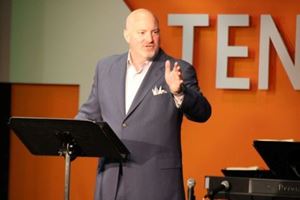
If you had to stop right now and rate your life -- choosing a number 1 through 10 -- what number would you choose? Are you living life to the fullest -- a 10? Have you hit bottom and have nowhere to go but up -- zero?
Most of us aspire to greater and bigger. We're naturally ambitious. We want to make a difference in the world. We want to be able to retire in comfort, even luxury. So, we look at our lives and probably give ourselves a 6 or even an 8. We know there's better out there!
Does this describe you?
"Most of us have some awareness of the future that is in us," writes author Terry Smith -- who challenges us all to achieve a 10. "We have moments when we catch our breath in wonder as we briefly glimpse possibilities vastly preferred over our past and present. We intuit something great and grand and from God percolating just beneath the surface of our lives."
So, what will it take to achieve a 10?
"We can become fully awake to this future," writes Smith. "We can bring this future from the nebulous realm of the subconscious into the world of the conscious. We can move the mystery toward the intentional. Once we do, we can partner with God to create the tomorrow He has dreamed for us—the future we were made for. We can create our God-inspired futures."Many of us dream of living a richer and more significant life — the kind of fulfilling life that, when rated on the scale of one to ten, would score a definitive ten.
“We can only know life in all its fullness if we live the life God dreams
So, what should you do?
Awaken: Wake up to God’s dreams for your life
Smith’s book is based on the tenth verse of the tenth chapter in the Book of John. It’s a guide to living the life God dreams for us.
Many of us dream of living a richer and more significant life—the kind of fulfilling life that, when rated on the scale of one to ten, would score a definitive ten.
Most of us have some awareness of the future that is in us. We have moments when we catch our breath in wonder as we briefly glimpse possibilities vastly preferred over our past and present. We intuit something great and grand and from God percolating just beneath the surface of our lives.
We can become fully awake to this future. We can bring this future from the nebulous realm of the subconscious into the world of the conscious. We can move the mystery toward the intentional. Once we do, we can partner with God to create the tomorrow He has dreamed for us—the future we were made for. We can create our God-inspired futures.
Awaken: Cooperate with God
“I don’t think people want enough,” states Smith “Not more stuff. More life. And not just for ourselves but also for others.”
God-inspired futures are futures that are better, best, preferred. But God does not force these futures on us. He allows us to choose whether to actualize them. We can cooperate with Him in the continuing act of creating the life and the world He envisioned. And we can experience more and more what He made in the beginning, before terrible human choices messed everything up.
Discover: Learn how to discover your life’s calling
God, in His infinite wisdom, created the world in intricate measure and form. He was exact in every minute detail—from the specific rotation of the earth on its axis to the precise measure of sunlight necessary to make a daisy grow. But into this perfection, He introduced a variable: people—to whom He gave the capacity to make decisions, even about the perfect things He had made.
Don’t you see God operating that way in our lives? He creates something, or has an idea. He brings it to a person, and says, “Look what I have for you. What do you want to do with it? What do you want to name this? Whatever you name it, that’s what its name will be. It’s up to you.”
“It seems that God is constantly alternating between being a spectator and being a participant in human affairs. This much I know: God insists that we participate in bringing even what He says is possible to pass,” writes author Terry Smith. “At very distinct times in my life, it seems that God has brought His dreams for me, and His dreams for the areas over which I have influence, and said, “Terry, this is what I have made for you. I call this possible. Now what do you want to call it?”
Possibilities are hints from God! They enter our consciousness through the portal of spirit and become a vision, a thought, an idea. We must pray, make decisions, activate faith, and take action in order for these things to leave the spiritual and become physically real. God wants us to join with Him in crafting our preferred futures.
Imagine: Learn how the discipline of imagination makes the future real
Smith notes how Richard Foster wrote the classic Celebration of Discipline about the spiritual habits that God uses to engage actively in our lives. Among disciplines such as prayer, fasting, and corporate worship, Foster explores meditation. The principal portal of meditation, he suggests, is the imagination.
“I want to propose a new discipline,” writes Smith, “the ‘discipline of imagining.” We must intentionalize imagining—deliberately and prayerfully imaging the specific things we believe God has said are possible for us. We must regularly practice this in the same manner as we engage in other spiritual practices. “We simply must become convinced of the importance of thinking and experiencing in images.”
Grow: Develop the life infrastructure necessary to sustain success
“We’ve all experienced painful growth moments,” writes Smith. “I think of times when I came to sobering realizations that there would be some major repercussions if I didn’t change in some way, grow in some area, or develop some part of my character more fully. I knew that even God-inspired dreams for my life, my family, and the church I served would never be fulfilled if I didn’t grow.
“I can remember as a very young man becoming aware that other people viewed me as talented yet cocky. A deep recognition of my need to humble myself before God became a central focus in my life. I remember another time when I came to understand that as a leader and as a husband I desperately needed to learn what it meant to be a servant.
“I came to the conclusion that if I didn’t learn servanthood, my relationships with the people most important to me would end up being broken. I can also remember coming to the realization that to build a winning and spiritually connected team, I had to be fully engaged in caring for the holistic health of my teammates.
“I had to share power. Give others the credit. Not be intimidated as I surrounded myself with people more talented than I am. Those are just a few examples of development I have experienced as a person and as a leader. I still have much more growing to do.”
The greater our God-inspired ambitions, the greater is our need to develop the life infrastructure necessary to sustain them. An infrastructure can be described as a substructure or underlying foundation. Our life infrastructure has to do with our spiritual formation, the building of our character, the shaping of our attitude, the gaining of knowledge, and learning to apply all of this to our lives through wisdom. It pertains to the things that lie beneath the surface of our lives but provide the foundation for everything else.
Act: Take action to create your future
We must understand that our actions create history. James Sire wrote, “God created the cosmos as a uniformity of cause and effect in an open system. . . . God is constantly involved in the unfolding pattern of the ongoing operation of the universe. And so are we as human beings! . . . If the universe were not orderly, our decisions would have no effect. If the course of events were determined, our decisions would have no significance.”
Darrow Miller said, “God has given us the unfathomable privilege of being co-creators with Him. Man, made in God’s image, is given the awesome task of bringing forth all the potential of creation . . . history is open, also; God, angels, and men can intervene to change its course. ”It’s no wonder then that cultures rooted in this ethic believe that life can get better, that progress is possible in the material world. These types of societies not only have hope for the future, but also reflect a sense of ambition, action, discovery, and optimism. They act to make history better.
Though we are predestined, we have the ability to make choices that determine whether or not our destinies will unfold as God has intended. Do not sit around and wait for history to happen to you. While we know the end of the story for the universe, we don’t know what our role will be in it. Do not live as if your actions have no impact. Be an actor, not a victim.
Lead: Learn to lead yourself and others to the best possible future
Who wants to enter into a preferred future alone? “A moral future is an inclusive one,” writes Smith. “I want my future to be experienced in the company of many people I’ve inspired to their own preferred futures.”
Leadership is about accepting responsibility for others. We are obligated to more than just ourselves. We are obligated to countless people we have direct or indirect, immediate or future influence over. If we are moral people, we cannot not be leaders.
Go: Accept the call to get started living the life God dreams for you
Moving from where we are to where we’re called to go is going tobe challenging.
“Trying to make a difference—change things—is always challenging,” writes Smith. “I like what former Federal Communications Commission head Michael Powell said when discussing the shift from the old to the new digital technology: ‘It will be messy and it will be confusing, and we will get a lot of it wrong and we will have to start over. But that’s the creative process.’
That statement could be made about most change efforts in our lives. When we start to bring significant transformation of any kind—to make the future is different than our present in substantive ways—it usually begins a wonderfully messy adventure, oftentimes confusing and frequently full of both deep pain and great joy.
“I think some of us naively get on the path to our future and get surprised by the constant ‘three steps forward and two steps back’ reality,” writes Smith.
The way to our God-inspired future is not a perfect linear process. Nor is it the straight line depicted by an organizational change graph, inevitably ascending toward what is better, best, and preferred. It looks more like the graph depicted below. The path to the future is a squiggly line.
Do you want more?
“I believe with all my heart that each of us can experience life in all its fullness,” writes Smith. “More and better life than we ever dreamed of. We can create a better future—the best possible future—for ourselves and others. We can have total fulfillment.
If we want to.

